THE HOUSTON HURRICANE POLLUTION-SNIFFING NASA FLIGHT THAT NEVER TOOK OFF 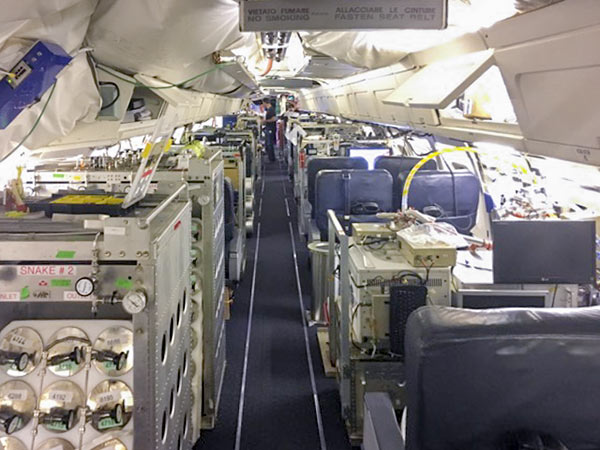 A week and a half after Hurricane Harvey hit Houston, as damage to smokestacks, pipelines, and chemical storage tanks were still being assessed, flooded Superfund sites went unmonitored, and clouds of benzene and other chemicals assembled in the skies over the city, the crew of a California-based airborne NASA chemical lab offered to help figure out the state of affairs — by diverting its specially equipped DC-8 from a planned trip to Oklahoma to take measurements in Houston instead. But EPA and TCEQ officials vehemently passed on the offer. An email response from TCEQ air toxicologist Michael Honeycutt noted that “state data showed no sign for concern,” report the L.A. Times‘s Susanne Rust and Louis Sahagun. “We don’t think your data would be useful for source identification while industry continues to restart their operations,” wrote Honeycutt, who the following month was appointed to head the EPA’s Science Advisory Board by President Trump. David Gray, the EPA official in charge of the Harvey emergency response, agreed. Citing emails from Texas officials “stating unambiguously that they do not want NASA to use the DC-8 for any data acquisition,” Michael Freilich, the director of NASA’s Earth Sciences division, called off the mission. [L.A. Times] Photo of Atmospheric Tomography Mission DC-8 interior, September 2017: NASA
A week and a half after Hurricane Harvey hit Houston, as damage to smokestacks, pipelines, and chemical storage tanks were still being assessed, flooded Superfund sites went unmonitored, and clouds of benzene and other chemicals assembled in the skies over the city, the crew of a California-based airborne NASA chemical lab offered to help figure out the state of affairs — by diverting its specially equipped DC-8 from a planned trip to Oklahoma to take measurements in Houston instead. But EPA and TCEQ officials vehemently passed on the offer. An email response from TCEQ air toxicologist Michael Honeycutt noted that “state data showed no sign for concern,” report the L.A. Times‘s Susanne Rust and Louis Sahagun. “We don’t think your data would be useful for source identification while industry continues to restart their operations,” wrote Honeycutt, who the following month was appointed to head the EPA’s Science Advisory Board by President Trump. David Gray, the EPA official in charge of the Harvey emergency response, agreed. Citing emails from Texas officials “stating unambiguously that they do not want NASA to use the DC-8 for any data acquisition,” Michael Freilich, the director of NASA’s Earth Sciences division, called off the mission. [L.A. Times] Photo of Atmospheric Tomography Mission DC-8 interior, September 2017: NASA
Tag: Hurricane Harvey
OTHER LOCAL RECIPIENTS OF THE UAE’S HARVEY FOREIGN AID CHECK: LIBRARY, HOMELESS SHELTER, KIDS HEALTH SQUAD 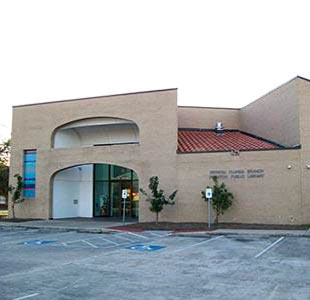 Also receiving a chunk of that $6.5 million check that the United Arab Emerites announced its cutting Houston: the city’s Flores Neighborhood Library branch at 110 N. Milby St. It’s been closed since Harvey, but the books and equipment inside the building at Milby and Canal are mostly in decent shape, a spokesperson for Councilwoman Karla Cisneros told the Chronicle‘s Alyson Ward last summer. (The floor and drywall, she says, are another story.) $800,000 will go toward repairs as well as “upgrades to the library’s programming and computer lab and the purchase of new furniture,” according to the city’s press release. Beyond the library, a new homeless shelter to be built in an unspecified location will also get in on the UAE aid money: $2 million of it. Dubbed The Navigation Center, it’ll provide temporary housing for folks waiting on somewhere else more permanent and will also function as a disaster recovery shelter during storms. And last but not least, Houston’s health department is getting $1.1 million, which it’ll use to fight environmentally-induced illnesses in children. How so? By bringing its asthma education program into 3 more ISD schools, testing kdis for blood lead poisoning, and creating a new illness screening team its calling the Children’s Environmental Health Mobile Unit. [City of Houston] Photo: Houston Public Library
Also receiving a chunk of that $6.5 million check that the United Arab Emerites announced its cutting Houston: the city’s Flores Neighborhood Library branch at 110 N. Milby St. It’s been closed since Harvey, but the books and equipment inside the building at Milby and Canal are mostly in decent shape, a spokesperson for Councilwoman Karla Cisneros told the Chronicle‘s Alyson Ward last summer. (The floor and drywall, she says, are another story.) $800,000 will go toward repairs as well as “upgrades to the library’s programming and computer lab and the purchase of new furniture,” according to the city’s press release. Beyond the library, a new homeless shelter to be built in an unspecified location will also get in on the UAE aid money: $2 million of it. Dubbed The Navigation Center, it’ll provide temporary housing for folks waiting on somewhere else more permanent and will also function as a disaster recovery shelter during storms. And last but not least, Houston’s health department is getting $1.1 million, which it’ll use to fight environmentally-induced illnesses in children. How so? By bringing its asthma education program into 3 more ISD schools, testing kdis for blood lead poisoning, and creating a new illness screening team its calling the Children’s Environmental Health Mobile Unit. [City of Houston] Photo: Houston Public Library
LEAGUE CITY’S LONGHORN CATTLE MUSEUM REOPENS 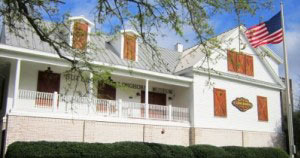 All bovine exhibits at the house-turned-museum-and-events-venue at 1220 Coryell St. are now back on view following months of renovations to address flood damage, reports the Chronicle’s Jennifer Bolton. Opened in 2009, The Butler Longhorn Museum, focuses specifically on the iconic cattle breed and the 19th century efforts of the Butler family, members of which helped save the animals from extinction through work on their land in what’s now League City, Kemah, Friendswood, and a few mainland portions of Galveston County. “While most of the exhibits could be — and were — redone, there were murals painted on the downstairs walls of the museum that had to be torn apart,” reports Bolton. Also out of commission: a separate education building that sits on the same 10 acres as the museum itself. [Houston Chronicle] Photo: Butler Longhorn Museum
All bovine exhibits at the house-turned-museum-and-events-venue at 1220 Coryell St. are now back on view following months of renovations to address flood damage, reports the Chronicle’s Jennifer Bolton. Opened in 2009, The Butler Longhorn Museum, focuses specifically on the iconic cattle breed and the 19th century efforts of the Butler family, members of which helped save the animals from extinction through work on their land in what’s now League City, Kemah, Friendswood, and a few mainland portions of Galveston County. “While most of the exhibits could be — and were — redone, there were murals painted on the downstairs walls of the museum that had to be torn apart,” reports Bolton. Also out of commission: a separate education building that sits on the same 10 acres as the museum itself. [Houston Chronicle] Photo: Butler Longhorn Museum
COUNTY COMMISSIONERS HOLD OFF ON REPAIRS TO DOWNTOWN’S SOGGY CRIMINAL JUSTICE SKYSCRAPER  The County Commissioners were set to approve repairs to the chronically wet Harris County Criminal Justice Center on Tuesday when District Attorney Kim Ogg — who occupies the building along with her 735 employees — convinced them to tap the brakes, calling it “unseemly . . . that we would be spending $14 million when we still don’t know the cause of the flooding.” Writing in November, the Houston Chronicle‘s Brian Rogers blamed it on: “unprecedented amounts of standing water,” that “seeped into the underground walls” of the building even though its flood gates remained secure. But he noted that some county officials believe there were “multiple sources,” of water and remained unsure about how it all got in. The 18-year-old building at 1201 Franklin St. partly reopened in June. The repairs that the commissioners had planned to authorize this week included fixes to its elevator shafts and parts of floors 2 through 20. (They suffered damage when the electronics in the basement — dampened by floodwaters — malfunctioned, sending gallons of water through the building’s anti-flood pumping system, which ironically, burst pipes and flooded the upper stories.) Following up on Ogg’s remarks, County Engineer John Blount raised the possibility of building a new criminal justice building from scratch. The estimated cost he gave for doing so: $430 million. [Houston Chronicle] Photo: Harris County
The County Commissioners were set to approve repairs to the chronically wet Harris County Criminal Justice Center on Tuesday when District Attorney Kim Ogg — who occupies the building along with her 735 employees — convinced them to tap the brakes, calling it “unseemly . . . that we would be spending $14 million when we still don’t know the cause of the flooding.” Writing in November, the Houston Chronicle‘s Brian Rogers blamed it on: “unprecedented amounts of standing water,” that “seeped into the underground walls” of the building even though its flood gates remained secure. But he noted that some county officials believe there were “multiple sources,” of water and remained unsure about how it all got in. The 18-year-old building at 1201 Franklin St. partly reopened in June. The repairs that the commissioners had planned to authorize this week included fixes to its elevator shafts and parts of floors 2 through 20. (They suffered damage when the electronics in the basement — dampened by floodwaters — malfunctioned, sending gallons of water through the building’s anti-flood pumping system, which ironically, burst pipes and flooded the upper stories.) Following up on Ogg’s remarks, County Engineer John Blount raised the possibility of building a new criminal justice building from scratch. The estimated cost he gave for doing so: $430 million. [Houston Chronicle] Photo: Harris County
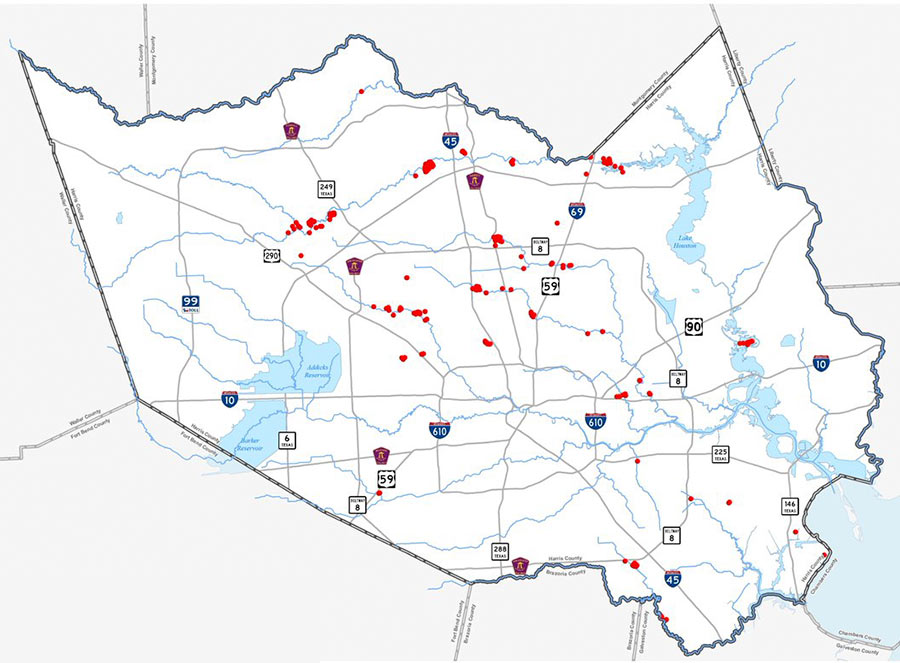
Now that a second, $51 million round of FEMA funding for home buyouts has come through, here’s the map of where the latest government snatch-ups are planned, 294 total. As indicated by the red dots above, they’re all outside the Loop — with a good portion grouped in 3 distinct clusters along Cypress Creek (which drowned out previous flooding records along nearly its entire length during Harvey). Other hotspots include several along White Oak Bayou, as well as a Greens-Bayou-adjacent bunch off Beltway 8 just north of Aldine and a San Jacinto River-side group south of Hwy. 90, near Highlands.
The money Harris County Flood Control District expects to receive for these purchases supplements an earlier $25.6 million FEMA committed to it on June 4. That previous check (along with an $8.6 million match the Harris County Commissioners okayed in order to get it) will be spent on about 169 buyouts, mapped out below:
THE ONGOING TRAVELS OF CITY HALL’S FLOODED-OUT BASEMENT EMPLOYEES  Shell has been allowing the city’s procurement staff to stay for free in 74,000 sq. ft. at One Shell Plaza, across Smith St. from the City Hall basement they were forced out of by Harvey’s floodwaters. (They’re joined in the office tower by IT employees from the city’s 611 Walker facility, which suffered its own water damage when its sprinkler system malfunctioned in December). But the free ride is coming to an end this month, reports the Chronicle’s Mike Morris: Shell is charging $70,074 for June rent. Now, the city plans to move its refugee employees again — this time to Enterprise Plaza (pictured above) at 1100 Louisiana where they’ll stay from July 1 to the end of next year at a rate of $93,380 per month for 69,000 sq. ft. (about $1.7 million total). After that, they’ll head back to 611 Walker, which the city plans to have ready for permanent residents by then. As for the damaged City Hall basement and the tunnel connecting it to the adjacent annex across Bagby St., their interiors “remain stripped, the walls peeling or patched with plywood, the wood veneers in one stairwell warped to mark the water line just below the annex’s first floor.” [Houston Chronicle] Photo of 1100 Louisiana St.: Hines
Shell has been allowing the city’s procurement staff to stay for free in 74,000 sq. ft. at One Shell Plaza, across Smith St. from the City Hall basement they were forced out of by Harvey’s floodwaters. (They’re joined in the office tower by IT employees from the city’s 611 Walker facility, which suffered its own water damage when its sprinkler system malfunctioned in December). But the free ride is coming to an end this month, reports the Chronicle’s Mike Morris: Shell is charging $70,074 for June rent. Now, the city plans to move its refugee employees again — this time to Enterprise Plaza (pictured above) at 1100 Louisiana where they’ll stay from July 1 to the end of next year at a rate of $93,380 per month for 69,000 sq. ft. (about $1.7 million total). After that, they’ll head back to 611 Walker, which the city plans to have ready for permanent residents by then. As for the damaged City Hall basement and the tunnel connecting it to the adjacent annex across Bagby St., their interiors “remain stripped, the walls peeling or patched with plywood, the wood veneers in one stairwell warped to mark the water line just below the annex’s first floor.” [Houston Chronicle] Photo of 1100 Louisiana St.: Hines

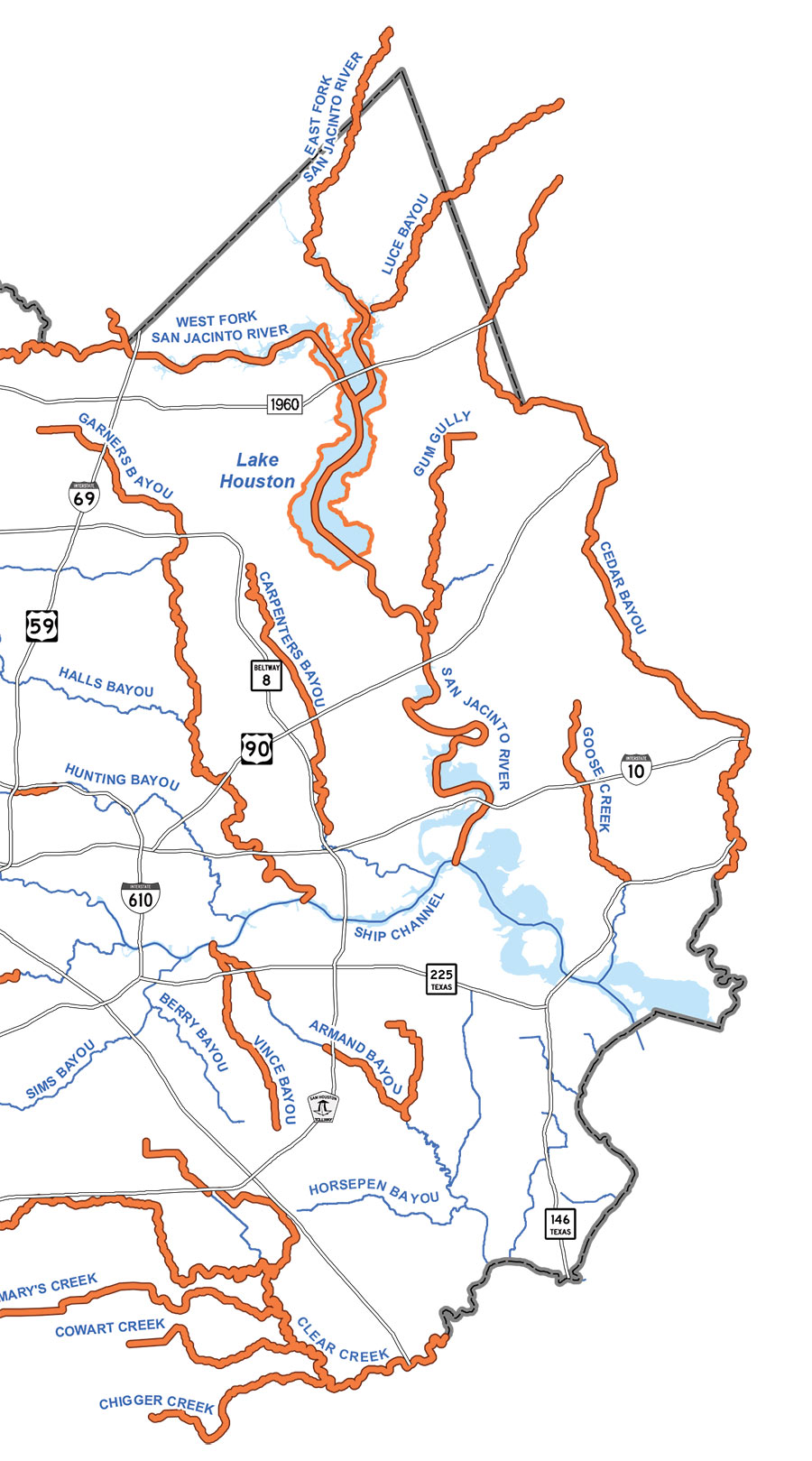
The final page of the Harris County Flood Control District’s final report on Hurricane Harvey includes the map above, with orange indicating where bayous, rivers, creeks, and gullies set new high water marks between August 25 and 29. Aside from Sims Bayou and a handful of smaller waterways, every other liquid landmark in the county outdid itself along some portion during the storm. Several — such as Cypress Creek and Carpenters Bayou (shown in detail above) — set new flood records along their entire lengths.
Less distinguished are White Oak and Little White Oak bayous, which broke records along only tiny stretches near Buffalo Bayou:
WHAT LANDLORDS HAVE OUSTED THE MOST TENANTS AFTER HARVEY, AND OTHER POST-DILUVIAN EVICTION FACTS 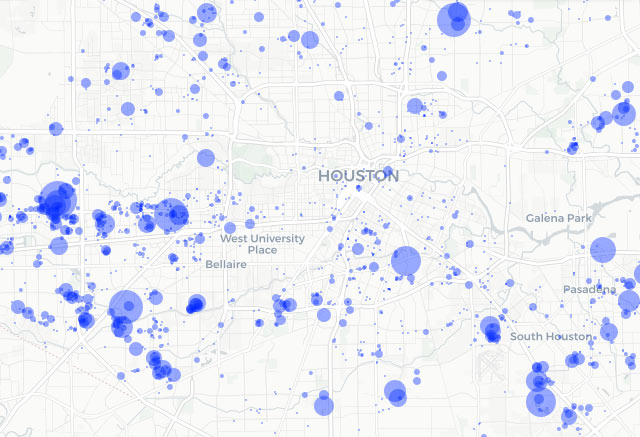 Since Harvey, the odds of tenants beating their eviction lawsuits have doubled. But their chances are still pretty slim: landlords win 94% of the time (down 3.73% since August), notes Houston data analyst Jeff Reichman. His recent report on citywide eviction trends after the storm features a ranking of which landlords have kicked out the most tenants. (Although that accounting also includes owners of storage rental facilities.) Also in the report: a map (a preview of which is included above) showing post-storm eviction density by address, an analysis of the time it takes for evictions to get through Houston’s court system (an average of 20 days), and the months during which the most evictions have historically occurred (January, with subsequent high volume between June and August). [January Advisors] Map of evictions after Harvey: January Advisors
Since Harvey, the odds of tenants beating their eviction lawsuits have doubled. But their chances are still pretty slim: landlords win 94% of the time (down 3.73% since August), notes Houston data analyst Jeff Reichman. His recent report on citywide eviction trends after the storm features a ranking of which landlords have kicked out the most tenants. (Although that accounting also includes owners of storage rental facilities.) Also in the report: a map (a preview of which is included above) showing post-storm eviction density by address, an analysis of the time it takes for evictions to get through Houston’s court system (an average of 20 days), and the months during which the most evictions have historically occurred (January, with subsequent high volume between June and August). [January Advisors] Map of evictions after Harvey: January Advisors
HOW SOME BIG INVESTMENT FIRMS ARE READYING HOUSTON FOR THE NEXT FLOOD 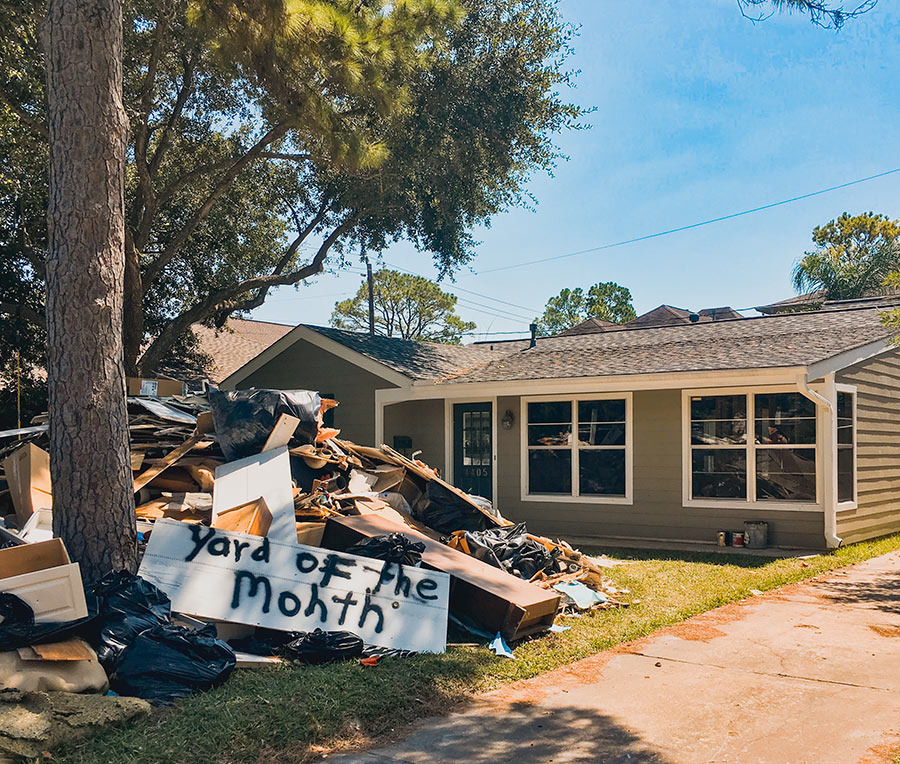 Whether homes flooded by Harvey are sold to investors or not makes a big difference, argue the Chronicle’s David Hunn and Matt Dempsey. For one thing, a sale closes the door to a county buyout — which often takes much longer to complete than a private purchase. Since Harvey, the reporters note, 88 houses Harris County had hoped to buy and demolish have already been snatched up by private parties, often for rehab and rental. Investment firms, by the writers’ count, have bought about 150 Harvey-flooded homes so far. Since about 2013, larger firms have been bundling rental homes in order to “sell the securities on Wall Street as a way to borrow money, fueling the purchase of even more homes.” But by maintaining the supply of floodable housing, Harris County Flood Control District’s Matt Zeve tells the writers, “All we’re doing is perpetuating a cycle of flooding.” At a national scale, according to university researchers quoted by Hunn and Dempsey, “rent-backed loans are already exhibiting characteristics of mortgage-backed securities” — the keynotes of the 2008 U.S. financial mess: “they’ve transferred the risk of default to taxpayers, stockholders and investors.” But investors seeking info about such rent bundles may be hard-pressed to get it: “While U.S. securities laws require funds to disclose significant risks about their investments, there are no specific requirements regarding flooded homes.” Hunn and Dempsey’s review of documents put out by public companies invested in flooded Houston houses shows that few of them, “if any,” have voluntarily told shareholders that they own such assets. [Houston Chronicle ($)] Photo of Harvey cleanup in Bellaire: Russell Hancock via Swamplot Flickr Pool
Whether homes flooded by Harvey are sold to investors or not makes a big difference, argue the Chronicle’s David Hunn and Matt Dempsey. For one thing, a sale closes the door to a county buyout — which often takes much longer to complete than a private purchase. Since Harvey, the reporters note, 88 houses Harris County had hoped to buy and demolish have already been snatched up by private parties, often for rehab and rental. Investment firms, by the writers’ count, have bought about 150 Harvey-flooded homes so far. Since about 2013, larger firms have been bundling rental homes in order to “sell the securities on Wall Street as a way to borrow money, fueling the purchase of even more homes.” But by maintaining the supply of floodable housing, Harris County Flood Control District’s Matt Zeve tells the writers, “All we’re doing is perpetuating a cycle of flooding.” At a national scale, according to university researchers quoted by Hunn and Dempsey, “rent-backed loans are already exhibiting characteristics of mortgage-backed securities” — the keynotes of the 2008 U.S. financial mess: “they’ve transferred the risk of default to taxpayers, stockholders and investors.” But investors seeking info about such rent bundles may be hard-pressed to get it: “While U.S. securities laws require funds to disclose significant risks about their investments, there are no specific requirements regarding flooded homes.” Hunn and Dempsey’s review of documents put out by public companies invested in flooded Houston houses shows that few of them, “if any,” have voluntarily told shareholders that they own such assets. [Houston Chronicle ($)] Photo of Harvey cleanup in Bellaire: Russell Hancock via Swamplot Flickr Pool
ORTHODOX SYNAGOGUE MULLS CROSSING THE LOOP TO SOMEWHAT HIGHER GROUND 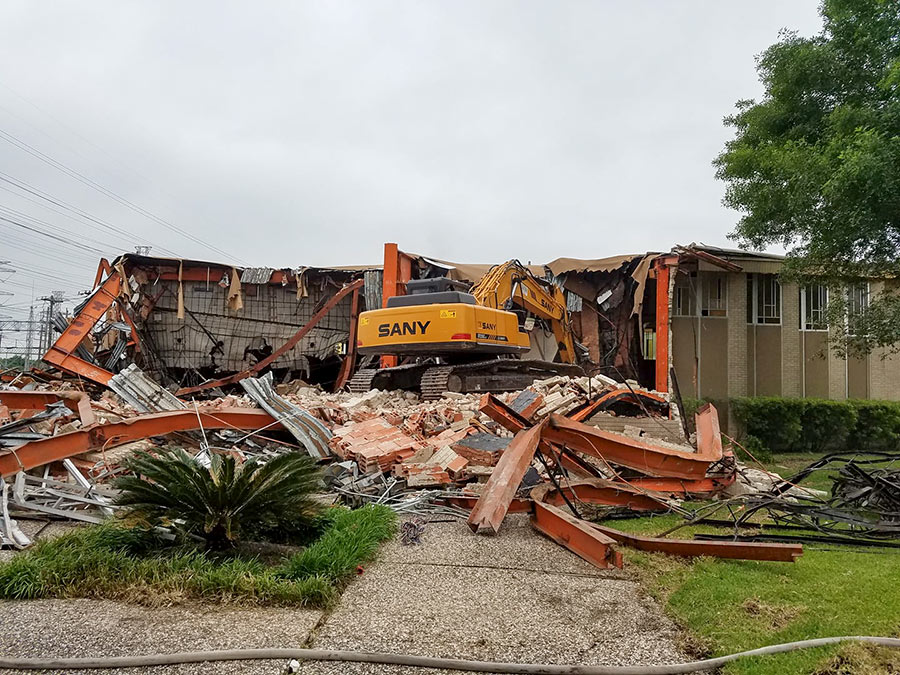 The roughly 820 homeowners in Willow Meadows are now voting on a deed restriction change that — if passed — would allow the United Orthodox Synagogue to build a new structure outside The Loop, in place of 5 houses that sit 3 quarters of a mile south down Greenwillow St. from the congregation’s previous home at the corner of S. Braeswood. Many congregants walk to the synagogue — which could soon be leaving the 100-year floodplain for the 500 after flooding 6 times in the last 25 years, including 3 in the last 3. “According to preliminary renderings,” reports the Jewish Herald Voice’s Michael C. Duke on Studio Red’s proposed design, “the synagogue would be a single-story structure, measuring an ultimate height of 30 feet. Based on new building codes, the finished floor of the building would be built some 3 feet above curb height, and the building itself would have the same 25-foot setback as homes in Willow Meadows.” Passage of the proposal “would prompt Houston’s largest Orthodox congregation to hold its own congregation-wide vote on whether to stay at its current location north of I-610 South and rebuild portions of its campus at a significantly higher elevation; or, to move.” Most of the congregation’s 57-year-old building was demolished last month, except for a few portions including its social hall and mikvah. [Jewish Herald Voice; previously on Swamplot] Photo of United Orthodox Synagogue’s demolition, 9001 Greenwillow St.: United Orthodox Synagogues of Houston
The roughly 820 homeowners in Willow Meadows are now voting on a deed restriction change that — if passed — would allow the United Orthodox Synagogue to build a new structure outside The Loop, in place of 5 houses that sit 3 quarters of a mile south down Greenwillow St. from the congregation’s previous home at the corner of S. Braeswood. Many congregants walk to the synagogue — which could soon be leaving the 100-year floodplain for the 500 after flooding 6 times in the last 25 years, including 3 in the last 3. “According to preliminary renderings,” reports the Jewish Herald Voice’s Michael C. Duke on Studio Red’s proposed design, “the synagogue would be a single-story structure, measuring an ultimate height of 30 feet. Based on new building codes, the finished floor of the building would be built some 3 feet above curb height, and the building itself would have the same 25-foot setback as homes in Willow Meadows.” Passage of the proposal “would prompt Houston’s largest Orthodox congregation to hold its own congregation-wide vote on whether to stay at its current location north of I-610 South and rebuild portions of its campus at a significantly higher elevation; or, to move.” Most of the congregation’s 57-year-old building was demolished last month, except for a few portions including its social hall and mikvah. [Jewish Herald Voice; previously on Swamplot] Photo of United Orthodox Synagogue’s demolition, 9001 Greenwillow St.: United Orthodox Synagogues of Houston
WHAT’S INCLUDED IN JOHNNY STEELE DOG PARK’S FLOOD-INDUCED REDO 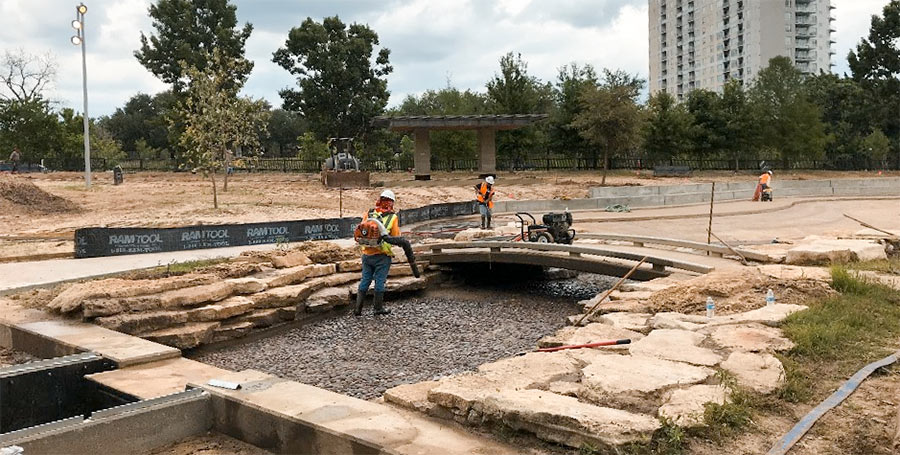 The caretakers of that oft-flooded pet park near Buffalo Bayou now say that “After careful consideration, we are making changes to the Johnny Steele Dog Park to improve maintenance operations and the park’s functionality.” Among those changes: getting rid of the pond in the large dog play area, rerouting the pond in the small dog area so that it flows through both sections, adding a “new seating wall” at the edge of the water, expanding the lawns throughout the park, enlarging the entrance to the large dog area, and creating a new entrance to the small dog area — all of which is expected to be done by early summer. [Previously on Swamplot] Photo: Buffalo Bayou Partnership
The caretakers of that oft-flooded pet park near Buffalo Bayou now say that “After careful consideration, we are making changes to the Johnny Steele Dog Park to improve maintenance operations and the park’s functionality.” Among those changes: getting rid of the pond in the large dog play area, rerouting the pond in the small dog area so that it flows through both sections, adding a “new seating wall” at the edge of the water, expanding the lawns throughout the park, enlarging the entrance to the large dog area, and creating a new entrance to the small dog area — all of which is expected to be done by early summer. [Previously on Swamplot] Photo: Buffalo Bayou Partnership
HARRIS COUNTY OPTS TO SCHEDULE FLOOD BOND VOTE FOR HARVEY’S ANNIVERSARY  The Harris County Commissioners Court voted this morning to move forward with scheduling a multi-billion-dollar flood control bond referendum — to fund property buyouts, bayou widening, and other mitigation efforts — for August 25. “Why August 25?†Judge Ed Emmett asked the room — which included the Chronicle’s Mihir Zaveri — “It’s the 1-year anniversary of Harvey. It’s got a certain sex appeal to it.†Commissioner Rodney Ellis at first opposed the commemorative date, fearing voter turnout could be weak during the summer. “If it is one shot that we have, I just want to make sure we get it right,†he said. (If the referendum fails, the earliest the court could hold another one would be in May 2019.) He argued instead for a date during November’s mid-term elections but changed his mind “for the sake of unity†after an appeal from fellow Commissioner Steve Radack — putting a unanimous finishing touch on the back-and-forth. What’s now needed in order to get it on the calendar? Governor Greg Abbott’s sign-off, followed by a vote from Harris County making the date official. [Houston Chronicle; more] Photo of Buffalo Bayou flooded by Hurricane Harvey: Adam Brackman
The Harris County Commissioners Court voted this morning to move forward with scheduling a multi-billion-dollar flood control bond referendum — to fund property buyouts, bayou widening, and other mitigation efforts — for August 25. “Why August 25?†Judge Ed Emmett asked the room — which included the Chronicle’s Mihir Zaveri — “It’s the 1-year anniversary of Harvey. It’s got a certain sex appeal to it.†Commissioner Rodney Ellis at first opposed the commemorative date, fearing voter turnout could be weak during the summer. “If it is one shot that we have, I just want to make sure we get it right,†he said. (If the referendum fails, the earliest the court could hold another one would be in May 2019.) He argued instead for a date during November’s mid-term elections but changed his mind “for the sake of unity†after an appeal from fellow Commissioner Steve Radack — putting a unanimous finishing touch on the back-and-forth. What’s now needed in order to get it on the calendar? Governor Greg Abbott’s sign-off, followed by a vote from Harris County making the date official. [Houston Chronicle; more] Photo of Buffalo Bayou flooded by Hurricane Harvey: Adam Brackman
SHUTTERED LANCASTER HOTEL’S POST-HARVEY REDO HAS BEGUN 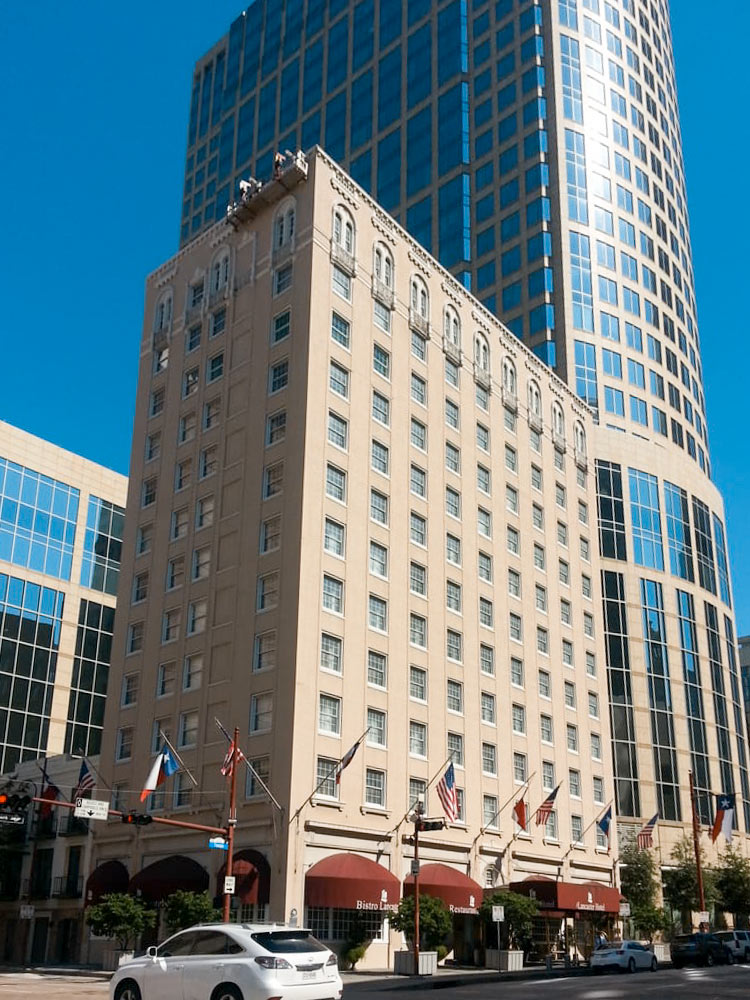 The latest purchasers of the recently-renovated Lancaster Hotel hotel at 701 Texas Ave. had only owned it for about 2 months before 2 ft. of water entered its lobby — and 12 its basement — during Harvey, reports the HBJ’s Cara Smith. Its last redo in 2013 was along the same lines (“significant alterations to the lobby, guest rooms, suites and meeting spaces,” the HBJ wrote then) as what Magnolia Lodging has planned for it now: “a redesigned lobby, guest rooms, a new restaurant and bar, an indoor mezzanine, an espresso bar and a new cardio fitness studio.” The 92-year-old structure has been shuttered since the storm, leaving its 12 stories and adjacent parking lot (where 2 buildings were demolished on Louisiana in 2016) unoccupied. [HBJ ($); previously on Swamplot] Photo: Jay H.
The latest purchasers of the recently-renovated Lancaster Hotel hotel at 701 Texas Ave. had only owned it for about 2 months before 2 ft. of water entered its lobby — and 12 its basement — during Harvey, reports the HBJ’s Cara Smith. Its last redo in 2013 was along the same lines (“significant alterations to the lobby, guest rooms, suites and meeting spaces,” the HBJ wrote then) as what Magnolia Lodging has planned for it now: “a redesigned lobby, guest rooms, a new restaurant and bar, an indoor mezzanine, an espresso bar and a new cardio fitness studio.” The 92-year-old structure has been shuttered since the storm, leaving its 12 stories and adjacent parking lot (where 2 buildings were demolished on Louisiana in 2016) unoccupied. [HBJ ($); previously on Swamplot] Photo: Jay H.
AFTER HARVEY, WILL KINGWOOD PROPERTY TAXES BE ENOUGH TO FUND A NEW EVACUATION ROUTE? 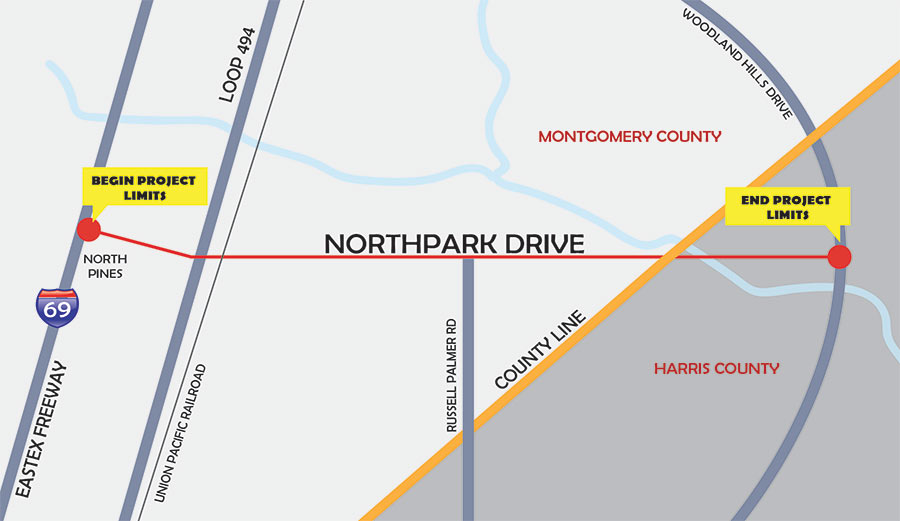 What would it take to turn Northpark Dr. into an all-weather evacuation route for Kingwood? “We’re going to have to bring it up out of that [floodplain],” TIRZ 10 consultant Ralph De Leon tells the Chronicle‘s Melainie Feuk, “which means the road’s going to have to come up.” The goal: “In a Harvey-like event, the road will still be passable and you can move people from the back of Kingwood to 69,” says city councilmember Dave Martin. TIRZ 10 had planned to issue bonds to fund a mile-and-a quarter segment of the project — between Russell Palmer Rd. and the Eastex Fwy. — but hit a snag. “Our big holdup,” TIRZ chairman Stan Sarman now says, “is waiting to see what’s going to happen to the appraised value.” Still in the works: the TIRZ’s funding application for the other portion of the road — east to Woodland Hills Dr. — which it plans to send in to the Houston Galveston Area Council sometime between June and July. [Houston Chronicle] Map of Northpark Dr. between Eastex Fwy. and Woodland Hills Dr.: Houston City Council
What would it take to turn Northpark Dr. into an all-weather evacuation route for Kingwood? “We’re going to have to bring it up out of that [floodplain],” TIRZ 10 consultant Ralph De Leon tells the Chronicle‘s Melainie Feuk, “which means the road’s going to have to come up.” The goal: “In a Harvey-like event, the road will still be passable and you can move people from the back of Kingwood to 69,” says city councilmember Dave Martin. TIRZ 10 had planned to issue bonds to fund a mile-and-a quarter segment of the project — between Russell Palmer Rd. and the Eastex Fwy. — but hit a snag. “Our big holdup,” TIRZ chairman Stan Sarman now says, “is waiting to see what’s going to happen to the appraised value.” Still in the works: the TIRZ’s funding application for the other portion of the road — east to Woodland Hills Dr. — which it plans to send in to the Houston Galveston Area Council sometime between June and July. [Houston Chronicle] Map of Northpark Dr. between Eastex Fwy. and Woodland Hills Dr.: Houston City Council
A LAWSUIT OVER RIVERSTONE’S VANISHED LEVEE 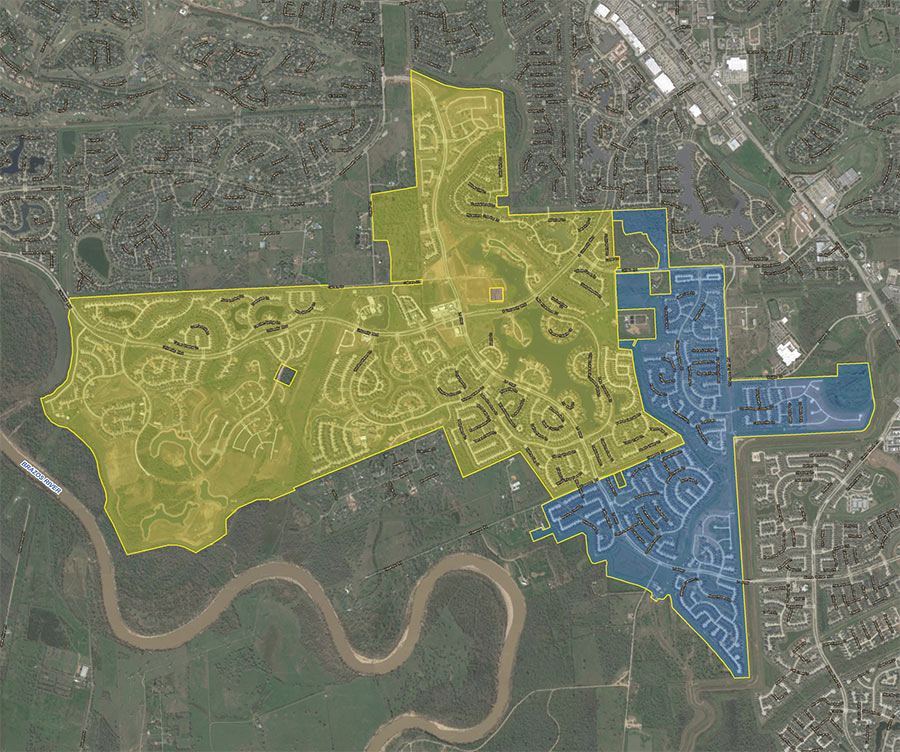 More than 400 residents of Fort Bend County’s Riverstone development — between Hwy. 6 and the Brazos River — are suing the engineering firm that designed their stormwater systems, alleging that the design left one portion of the community flooded by the runoff from the other during Harvey. The roughly 3,700-acre area is divided into 2 Levee Improvement Districts — LID 19 (shaded blue on the map) and 15. “It became very clear when we passed into LID 15 that something was not right,” one LID 19 homeowner said in a press conference. “We were inundated with water in our neighborhood, and just on the other side of the street everything seemed to be perfectly fine.” Both LIDs were designed by Costello, Inc. the company founded by Houston’s flood czar Steve Costello. (He’s said he divested from it in 2015.) That firm’s failure to consider what would happen when a levee that ran between the 2 districts — along Hagerson Rd. — was removed is what downstreamers say is to blame for much of their soggy state. In total, reports the Chronicle’s Rebecca Elliott, about a third of the 1,760 homes in LID 19 flooded. [Houston Chronicle] Map of Riverstone LIDs 15 and 19: Riverstone LIDs
More than 400 residents of Fort Bend County’s Riverstone development — between Hwy. 6 and the Brazos River — are suing the engineering firm that designed their stormwater systems, alleging that the design left one portion of the community flooded by the runoff from the other during Harvey. The roughly 3,700-acre area is divided into 2 Levee Improvement Districts — LID 19 (shaded blue on the map) and 15. “It became very clear when we passed into LID 15 that something was not right,” one LID 19 homeowner said in a press conference. “We were inundated with water in our neighborhood, and just on the other side of the street everything seemed to be perfectly fine.” Both LIDs were designed by Costello, Inc. the company founded by Houston’s flood czar Steve Costello. (He’s said he divested from it in 2015.) That firm’s failure to consider what would happen when a levee that ran between the 2 districts — along Hagerson Rd. — was removed is what downstreamers say is to blame for much of their soggy state. In total, reports the Chronicle’s Rebecca Elliott, about a third of the 1,760 homes in LID 19 flooded. [Houston Chronicle] Map of Riverstone LIDs 15 and 19: Riverstone LIDs

